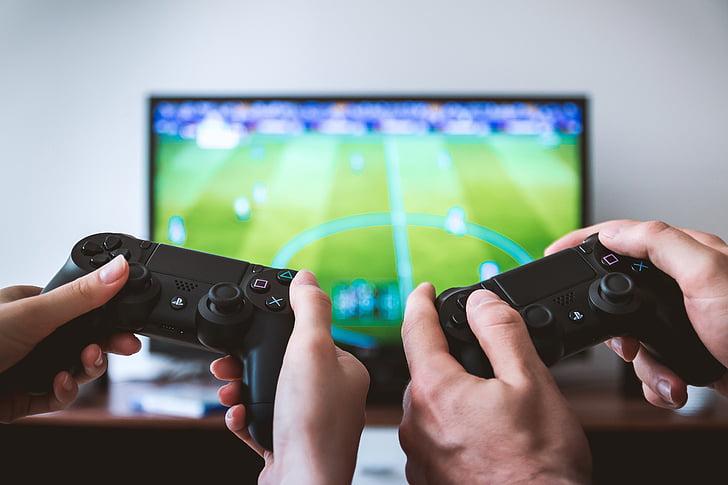The gaming industry is booming, yet with it a heated debate has emerged over whether or not to classify video game addiction as a real disorder. With everyone from doctors to gamers weighing in it can be hard to decide who and what to believe. Yet after diving deep into the debate, it’s clear that video game addiction should and must be taken seriously and managed accordingly. This article will unravel this debate and bring to light the facts behind video game addiction.
1. What is Video Game Addiction and How it Impacts Lives?
Video games and how they have caused havoc and destruction in society have been debated for decades. Video game addiction is a term used to describe when people have a strong compulsion to spend large amounts of time playing video games.
It is estimated that around 8–10 % of video-game players are addicted to some game, and this number is likely to grow in the future. As more and more people become captivated by video games, there are certain implications that accompany this newfound addiction.
Given how absorbing video games can be, they can often interfere with one’s ability to maintain relationships, achieve educational goals, hold down a job, and lead to physical health repercussions. According to research conducted at the University of Michigan, excessive video game playing is viewed as a maladaptive coping mechanism for addressing psychological distress.
Habit forming cycles are also common among people addicted to video games. Such cycles typically involve addicts gradually increasing game-based activities and substituting them with healthy activities.
- The more they play, the more their relationships and mental state deteriorate.
- The more they lose interest in their real-world activities, the more time they spend playing video games.
- The longer their gaming sessions get, the less healthy their lifestyle becomes.
Apart from causing gamers to become separated from real-world activities, video game addiction has also been associated with increased levels of depression, aggression, and anxiety. Therefore, it is important for gamers to take active steps to address their addiction in order to maintain healthy and full lives.
To this end, strategies like limiting the amount of time they play video games, setting limits on how often they play, and supplementing video gaming with other activities are all effective ways to help gamers decrease the amount of time spent playing video games. With this in mind, gamers can still enjoy gaming in moderation, but it is important to remember that moderation is the key.
2. Questions to Consider About Video Game Addiction
What are the Common Threats?
Video game addiction is an increasingly concerning issue. Many parents have begun to notice growing addiction in their children, leading to social problems, irregular sleeping patterns, and concern for physical health. It’s essential to review the potential threats that come along with video game addiction, and educate ourselves on how best to prevent our children from falling into the cycle of unhealthy behaviour.
- Interference with social relationships
- Impaired academic or occupational performance
- Developmental and health problems
- Financial difficulties
How Can We Create a Healthier Video Game Environment?
While it’s true that video games can be both beneficial and entertaining in moderation, it’s important to remember that video game addiction can lead to extreme consequences. It’s up to the individual user, as well as parents and other family members, to practice moderation in the use of video games and monitor for signs of addiction.
- Set limits on time, cost, and types of games
- Engage in a wide variety of activities
- Encourage physical exercise
- Establish rules and consequences for game usage
How do We Spot Signs of Addiction?
The symptoms of video game addiction can vary depending on a person’s age, gender, and social background. Some common signs can include isolation from friends and family, drastic changes in mood and sleep patterns, neglecting responsibilities, and an overall preoccupation with video gaming. If starting to notice any of these signs, it’s important to develop a plan for how to handle the situation and provide support for the person in need – before it’s too late.
- Observe changes in behaviour
- Pay special attention to sleep patterns
- Look for changes in social activities or interests
- Learn about video game addiction and its signs
3. The Unravelling Debate: Pros and Cons of Video Game Addiction
Video games have undoubtedly become part of our culture, offering engaging gameplay and captivating storytelling. This could lead to gamers getting heavily invested in gaming, continuing to play for long periods of time and sometimes even being seen as addicted. The idea of video game addiction has been around for several decades, spawning criticism and debate about whether such a phenomenon actually exists. Let’s delve into the pros and cons of the debate surrounding video game addiction.
Pros:
- Video games are a valid form of entertainment, providing an escape from reality and a source of relaxation to the countless people playing them.
- Excessive gaming can have positive impacts, such as learning important educational, social and problem-solving skills.
- Games can also encourage healthy competition and encourage positive forms of socialization among players.
- Loss of interest in a game does not always mean an individual is addicted, as people tend to move on from games that they may have grown bored of.
Cons:
- If an individual excessively plays video games, they may be depriving themselves of face-to-face social contact, leaving them less capable of communicating and interacting with people.
- An excessive amount of time can lead to poor physical health, such as sleep deprivation or a lack of nutrition.
- Compulsive and excessive gaming can sometimes lead to financial losses, especially for those who are unable to control their spending.
- Rigid gaming experiences can lead to negative emotions, such as frustration, anxiety, or even depression; as some gamers may be reflecting on their own lives through virtual experiences.
The debate about video game addiction is far from being solved, but these pros and cons certainly illustrate the two sides of the argument. Ultimately, it is up to players themselves to recognize their own habits and ensure that their gaming time is always spent in a way that is still enjoyable, yet also healthy.
4. Economic, Social, and Psychological Effects
Video game addiction is a complex and multi-faceted phenomenon with a number of potential impacts on individuals and society, presented both in terms of their severity and frequency. The economic, social and psychological effects of gaming addiction are far-reaching and almost impossible to ignore.
- Economic Effects: Excessive spending on gaming can have a direct effect on an individual’s economy. Time spent playing video games can lead to a decrease in work performance, decline in job satisfaction, and a decrease in wages. In extreme cases, the financial impact can be to cease meaningful career building and education altogether, leaving an individual in a difficult financial position.
- Social Effects: Individuals with gaming addiction are often socially isolated, barring them from making meaningful relationships. This, in turn, leads to further depression and a downward spiral. It burdens friends and families of the addicted people and can generate a great deal of tension in the family environment.
- Psychological Effects: Compulsive gaming can have innumerable psychological effects, such as sleep disturbances, depression, anxiety, and anger outbursts. It results in individuals neglecting real world activities and commitments, causing social exclusion and reducing an individual’s ability to effectively communicate with others. It can even affect motivation and lead to an unhealthy lifestyle, further resulting in physical and mental health problems.
All these effects are serious and long-term, leaving the individual and their family in a difficult situation. Factors such as age, gender, access to funds, psychiatric disorders, and social environment can influence how severely these effects are seen. It is paramount that addiction is diagnosed in its earliest stages, and that creative and tailored solutions are designed to help the affected individuals in their recovery.
5. Identifying Signs of Video Game Addiction
When it comes to the possible existence of Video Game Addiction, the opinions have been divided. It is important to be able to distinguish between normal gamers and addicts, to identify the signs of the addiction and to provide support to those affected. Here is a closer look at Video Game Addiction and how it can be recognised.
- Intensive Gaming: This is one of the major signs of video game addiction. An excessive amount of time spent on video gaming, even when it negatively impacts other aspects of life, is a symptom.
- Neglect of Responsibilities: An individual may neglect schoolwork, important meetings or family commitments if gaming proves to be more important. This is especially a danger for students.
- Increasingly Desperate Search for Achievement: A person may spend an inordinate amount of time trying to advance to the next level of a game and become increasingly frustrated if they are unable to achieve this.
- Loss of Interest in Other Activities: Another concerning symptom of video game addiction is if a person starts to lose interest in activities that they used to enjoy, such as sports, music or even socialising.
- Isolation: If a person shuns social situations to be able to play more, it is clear that gaming has become an issue.
It may not always be easy to identify video game addiction in yourself or in others, particularly young people who may not be willing to talk. However, careful monitoring of behaviour and taking heed of the signs mentioned above are important if a person is suspected of having an addiction.
6. How to Help Persons Struggling With Video Game Addiction
1. Recognizing Addiction
Having a passion for gaming can be great, but it’s important to recognize when someone may be struggling with video game addiction. The most common signs are playing video games much more than they should, using it as a way to cope with negative emotions, neglecting their other responsibilities and having difficulty curving their playing habits. Such behaviors can lead to loneliness, depression, and social isolation.
2. Start A Conversation
If you feel as though your friend or loved one is struggling with video game addiction, the best thing to do is to start a conversation about it. It’s important to be prepared with sound advice that doesn’t come off as judgemental and to provide a safe, non-judgmental space to openly talk about it. Paying attention to how your friend is feeling and offering words of affirmation may even be helpful.
3. Consider Self-Help
Not everyone is comfortable with talking openly about their struggle with video game addiction. If that’s the case, there a few self-help methods one can try to mitigate the problem. Setting limits on amount and hours of play, taking regular breaks and actively redirecting your energy to desirable activities are all effective measures. Additionally, joining an online or in-person support group could be a great way to stay accountable and interact with people in similar situations.
4. Professional Help
Sometimes self-help measures are ineffective. If the problem persists, the next steps involve professional help. Seeing a therapist can be a great way to explore the boundaries of addiction and possibly help discover the root of the issue. Some treatment centers also provide out-patient programs that offer comprehensive care from cognitive behavioral therapy to holistic therapies to life skill training – all of which can be helpful in overcoming gaming addiction.
- Set limits on playtime and stay committed.
- Take regular breaks.
- Redirect energy to desirable activities.
- Seek out in-person or online support groups.
- Visit a therapist for further assistance.
- Consider signing up for an out-patient program.
In conclusion, it can be quite daunting to help someone struggling with video game addiction. While it’s not an easy process, understanding the signs and being intentional with developing a healthy lifestyle for the individual in need is a great way to make a difference in their life.
7. A Way Forward: Recommendations on Balancing Life With Video Games
Video games have become increasingly prevalent in the lives of many people. For many, video games provide a source of entertainment and escape from everyday life. However, as they become a more integral part of people’s lives, there is a need to consider how to maintain a healthy balance between playing games and engaging in other activities. Here are some recommendations on finding this equilibrium.
Pay Attention to Time Limits
Establishing a daily limit on how long you can play video games is an important way to ensure that you maintain your wellbeing and engagement with other activities. It’s important to plan regular breaks from gaming and adhere to a specific time limit in order to remain productive and engaged with the rest of your life.
Ensure You Are Still Connecting With People
Video gaming can often be an isolating activity, so it’s important to make sure that you’re still staying connected with family and friends. Try to include some social components into your gaming, such as playing games online with friends, or attend video game meet-ups or tournaments in your local area.
Make Time For Other Activities
Spending a significant amount of time playing video games can be detrimental to your wellbeing, so it is important to make sure that you have plenty of time in your schedule for engaging in productive activities. Keep track of any hobbies or activities you’d like to pursue and make sure that you are allocating enough time to them.
Set Goals and Rewards for Yourself
Creating a system of goal-setting and rewards can be a helpful way to make sure that you are achieving and engaging in the activities you set out to. Goals provide direction and motivation, and rewards can provide motivation to keep going. Setting clear goals and targets, and rewarding yourself when you achieve them, can create a positive reinforcement for pursuing activities that foster wellbeing.
Seek Professional Help if Needed
If you or someone you know is having difficulty finding balance in life, it’s important to seek help from a professional. Talk to a counsellor or therapist if you feel that your gaming is having a negative impact on your life, or if it is starting to interfere with your mental or physical health. What’s clear from the debate around video game addiction is that the issue is complex and is likely to change and evolve over time. It’s up to us all to stay informed and look for more evidence-backed solutions so that we can either avoid or properly manage video game addiction. Hopefully, unraveling the debate in this article has been a step in the right direction.








Leave a Comment